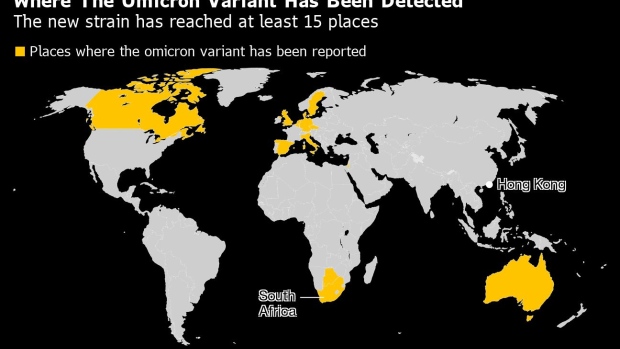Nov 30, 2021
Germany’s Incoming Vice-Chancellor Calls for ‘Lockdown of the Unvaccinated’
, Bloomberg News

(Bloomberg) -- Germany’s incoming vice chancellor called for a nationwide “lockdown for the unvaccinated” to check the latest surge in Covid-19 infections.
Ahead of Tuesday’s talks between federal and regional officials on pandemic strategy, Robert Habeck, a co-leader of the Greens, said only people who are inoculated or recovered should be allowed into non-essential stores and “public settings” across the country, rather than just in virus hotspots.
“We will need to face the winter with further coordinated measures,” Habeck said in an interview with ZDF television. He also raised the prospect of bringing forward or extending the Christmas school vacation.
The latest surge in infections appears to have caught German authorities by surprise, and the transition to a new administration under Social Democrat Olaf Scholz has complicated pandemic coordination with Chancellor Angela Merkel’s outgoing government.
Another round of talks between federal officials and the 16 state premiers was due on Dec. 9, but the meeting has been brought forward to Tuesday to allow them to address a Constitutional Court ruling on the scope of pandemic restrictions due at 9:30 a.m. in Karlsruhe.
The court is expected to set out the legal parameters for restrictive measures, including whether steps such as nighttime curfews and closing schools are admissible.
Saskia Esken, a co-leader of Scholz’s Social Democratic party, said Tuesday that more restrictions will likely be needed for those who aren’t vaccinated and for public gatherings like soccer matches.
She also declined to rule out another full lockdown like in neighboring Austria, citing the emergence of the new omicron variant.
“These days I would urgently recommend to anyone who has political responsibility not to rule anything out,” Esken told ZDF. “We don’t know what the development will be, and we have this new variant in Europe and need to react to that.”
After Germany passed the threshold of 100,000 pandemic-related fatalities last week, there was a glimmer of positive news Tuesday when the seven-day incidence rate fell for the first time in nearly a month.
Merkel has consistently taken a hard line on restrictive measures and criticized the new governing parties for replacing an emergency pandemic law with less sweeping federal powers. The incoming government argues that states have sufficient tools at their disposal.
Scholz secured a coalition agreement last week with the Greens and the pro-business Free Democrats and is set to be sworn in next week.
Tuesday’s court ruling relates to a nationwide “emergency brake” law that enabled blanket lockdown measures. The “brake” was triggered when communities had a sustained incidence of more than 100 new infections per 100,000 people over seven days.
While the law lapsed in June, the court is expected to establish a precedent over when and how personal freedoms can be restricted or suspended.
Germany’s nationwide incidence rate slipped to 452.2 on Tuesday from 452.4 the previous day. There were 45,753 new cases and a further 388 deaths from the disease, according to data from the RKI public-health institute.
©2021 Bloomberg L.P.






